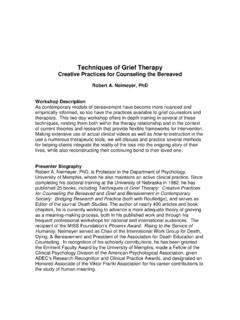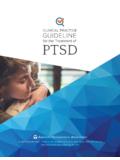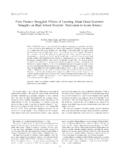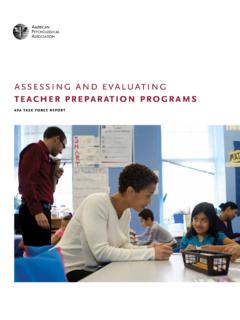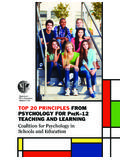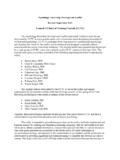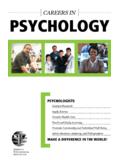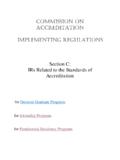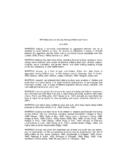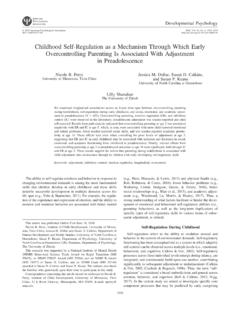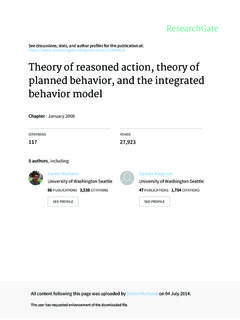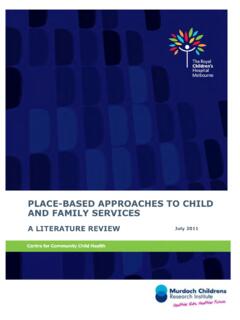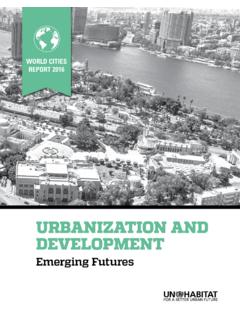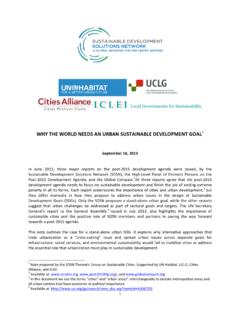Transcription of ASSESSMENT - American Psychological Association (APA)
1 ASSESSMENT . of Older Adults WITH DIMINISHED CAPACITY: A Handbook for Lawyers American Bar Association Commission on Law and Aging 740 Fifteenth Street, NW. Washington, DC 20005-1022. About the American Bar Association Commission on Law and Aging The mission of the American Bar Association (ABA) Commission on Law and Aging is to strengthen and secure the legal rights, dignity, autonomy, quality of life, and quality of care of elders. It carries out this mission through research, policy development, technical assistance, advocacy, education, and training. The ABA Commission consists of a 15-member interdisciplinary body of experts in aging and law, includ- ing lawyers, judges, health and social services professionals, academics, and advocates. With its professional staff, the ABA Commission examines a wide range of law-related issues, including: legal services to older per- sons; health and long-term care; housing needs; professional ethical issues; Social Security, Medicare, Medicaid, and other public benefit programs; planning for incapacity; guardianship; elder abuse; health care decision-mak- ing; pain management and end-of-life care; dispute resolution; and court-related needs of older persons with dis- abilities.
2 About the American Psychological Association The American Psychological Association (APA) is the largest scientific and professional organization rep- resenting psychology in the United States and is the world's largest Association of psychologists. Through its divisions in 53 subfields of psychology and affiliations with 59 state, territorial, and Canadian provincial asso- ciations, APA works to advance psychology as a science, as a profession, and as a means of promoting health, education, and human welfare. The APA Office on Aging coordinates the Association 's activities pertaining to aging and geropsychology (the field within psychology devoted to older adult issues). The Committee on Aging (CONA) is the committee within the APA governance structure dedicated to aging issues. Its six expert geropsy- chologists are selected for three-year terms. Together, the Office on Aging, CONA, and Association members promote the health and wellbeing of older adults and their families through expanded scientific understanding of adult development and aging and the delivery of appropriate Psychological services to older adults.
3 Copyright (c) 2005 by the American Bar Association and the American Psychological Association . All rights reserved. ISBN: 1-59031-497-2. Product Code: 4280025. Cite as: Legal Style: ABA Commn. on L. & Aging & Am. Psychological Assn., ASSESSMENT of Older Adults with Diminished Capacity: A Handbook for Lawyers (2005). APA Style: American Bar Association Commission on Law and Aging & American Psychological Association . (2005). ASSESSMENT of older adults with diminished capacity: A handbook for lawyers. Washington, DC: American Bar Association and American Psychological Association . Disclaimer. The views expressed in this document have not been approved by the governing or policy- setting bodies of the American Bar Association or the American Psychological Association and should not be construed as representing policy of either organization. This document is not intended to establish a standard of practice against which lawyer or clinician practice is to be evaluated.
4 Rather, it provides one approach that practitioners may find useful in understanding, assessing, and responding to clients and potential clients with diminished capacity. ii ASSESSMENT of Older Adults with Diminished Capacity: A Handbook for Lawyers Table of Contents Acknowledgements ..iv Executive Summary ..v I. Importance of Lawyer ASSESSMENT of Client Capacity ..1. A. Capacity Judgments and Legal Practice ..1. B. Increasing Prevalence of Capacity C. Model Rule ..2. D. Legal Malpractice ..2. E. Lawyer ASSESSMENT of Capacity ..3. II. Legal Standards of Diminished A. Standards of Capacity for Specific Legal Transactions ..5. B. Diminished Capacity in State Guardianship C. Ethical Guidelines for Assessing III. Clinical Models of Capacity ..9. A. General Clinical Model of Capacity ..9. B. Specific Domain Models of Capacity ..11. IV. Lawyer ASSESSMENT of Capacity ..13. A. Observing Signs of Possible Diminished Capacity ..13. B. Evaluating a Client's Understanding in Relation to Legal Elements of Capacity.
5 17. C. Considering Factors from Ethical Rules ..18. D. Performing the Legal Analysis and Categorizing the Legal Judgment ..19. E. Documenting the Capacity Judgment ..19. F. Taking Actions Following Informal Capacity ASSESSMENT ..20. G. Caution Against Lawyer Use of Psychological Instruments ..21. Capacity Worksheet for Lawyers ..23. V. Techniques Lawyers Can Use to Enhance Client A. Engendering Client Trust and B. Accommodating Sensory Changes ..28. C. Accommodating Cognitive Impairments ..28. D. Strengthening Client Engagement in the Decision-Making VI. Referrals for Consultation or Formal ASSESSMENT ..31. A. Basic Considerations in Seeking Consultation or Referral ..31. B. Selecting a Clinician ..32. C. Elements of a Lawyer's Referral to a Clinician ..33. VII. Understanding and Using the Capacity ASSESSMENT Report ..37. A. Understanding the Elements of the Capacity Report ..37. B. Clinical Capacity Opinions Versus Legal Capacity Outcomes ..39. C. Using the Capacity Report.
6 39. Appendix 1: Capacity ASSESSMENT Algorithm for Lawyers ..42. Appendix 2: Case Examples ..43. Appendix 3: Brief Guide to Psychological and Neuropsychological Instruments ..59. Appendix 4: Dementia Overview ..67. End ASSESSMENT of Older Adults with Diminished Capacity: A Handbook for Lawyers iii Acknowledgements This handbook represents a collaborative effort of members of the American Bar Association (ABA) and the American Psychological Association (APA). Formal collaborative efforts between the ABA and the APA began in 1995 with the establishment of the interdisciplinary Task Force on Facilitating APA/ABA Relations. Since that time, the task force has identified, developed, and pursued productive interdisciplinary projects and relation- ships. Interactions between the APA and the ABA have resulted in collaboration on a number of activities and facilitated useful forums for the exchange of views about critical issues and concerns affecting psychology and the law.
7 ASSESSMENT of Older Adults with Diminished Capacity: A Handbook for Lawyers represents the first work product of the ABA/APA ASSESSMENT of Capacity in Older Adults Project Working Group, established in 2003. under the auspices of the Task Force on Facilitating APA/ABA Relations. In June 2003, a two-day meeting, Legal and Psychological Perspectives on ASSESSMENT of Capacity in Older Adults: An ABA-APA Dialogue, brought together a group of attorneys, psychologists, and a probate judge to dis- cuss professional needs. Among the issues identified was a need for a handbook for attorneys on working with older adults with diminished capacity with a focus on attorney ASSESSMENT . Subsequent to the meeting, the ABA/APA ASSESSMENT of Capacity in Older Adults Project Working Group was formed. The group met again in December 2003. At that meeting an outline for the handbook was developed and chapter authors were iden- tified. Members of the ABA/APA Working Group are: Nancy Coleman, , ; Deborah DiGilio.
8 Barry Edelstein, ; Gregory Hinrichsen, ; Daniel Marson, , ; Jennifer Moye, ; Leonard Poon, ; David Powers, ; Charles Sabatino, ; and Erica Wood, Daniel Marson and Jennifer Moye contributed case examples. Jennifer Moye was the editor of this handbook. The working group acknowledges the input of Betsy Abramson, ; Donna Beavers, ; Edwin Boyer, ; Baird Brown, ; Hon. John Kirkendall; and John Laster, The draft handbook was also reviewed by the APA Committee on Aging, the APA Ad Hoc Committee on Legal Issues, APA Division 12, Section II - Clinical Geropsychology, APA Division 20 - Adult Development and Aging, APA Division 40 - Clinical Neuropsychology, and a focus group of elder law attorneys. A special thanks goes to Katie Maslow, , of the Alzheimer's Association , for her contribution in preparing the appendix on dementia. We are grateful to these groups and a host of other professionals for their helpful comments and suggestions on earlier drafts of this hand- book.
9 The working group also expresses its special thanks to Jamie Philpotts for her superb editorial assistance. Finally, we wish to acknowledge for their financial support in the printing and distribution of this handbook the Borchard Foundation Center on Law and Aging, the Gerontology Center at the University of Georgia, Camilla O. McRory, attorney at law, and B. Hudnall Stamm, , Institute of Rural Health, Idaho State University (under the institute's grant # 1 D1B TM 00042-01 from the Department of Health and Human Services (DHHS) Health Resources and Services Administration, Office for the Advancement of Telehealth). The contents are the sole responsibility of the authors and do not necessarily represent the official views of DHHS. iv ASSESSMENT of Older Adults with Diminished Capacity: A Handbook for Lawyers Executive Summary With the coming demographic avalanche of elder law attorneys, trusts and estates lawyers, family Boomers reaching their 60s and the over-80 popula- lawyers, and general practitioners.
10 It introduces tion swelling, lawyers face a growing challenge: older lawyers to a wide spectrum of mental health profes- clients with problems in decision-making capacity. sionals, including, but extending beyond, licensed While most older adults will not have impaired capac- psychologists. Interdisciplinary partnerships between ity, some will. Clear and relatively obvious dementias lawyers and clinicians promise more informed will impair capacity, and the prevalence of such approaches for helping older clients meet their legal dementias increases with age. But what about older needs. adults with an early stage of dementia or with mild The handbook is not a practice standard meant to central nervous system damage? Such clients may outline compulsory actions. Instead, it offers ideas for have subtle decisional problems and questionable effective practices and makes suggestions for attor- judgments troubling to a lawyer. This handbook offers neys who wish to balance the competing goals of a conceptual framework and practice tips for address- autonomy and protection as they confront the chal- ing problems of client capacity, in some cases with lenges of working with older adults with diminished help from a clinician.
